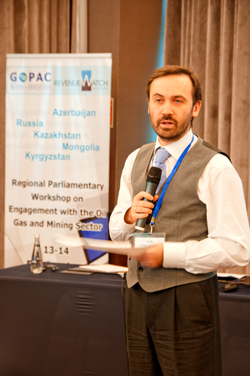
One Man's Stand, and a Different Kind of Resource Curse
Last month, Ilya Ponomarev earned a place in history as the only one of 446 members of the Russian Duma to vote against making Crimea a part of Russia. But back in December, I had an interesting exchange with him during one of the sessions I was delivering at the Revenue Watch Institute’s Eurasia parliamentary workshop in Istanbul.

Ilya Ponomarev, Russian MP
There—curiously enough at a place where east is said to meet west—he was questioning the sincerity and selflessness of what he called “Western transparency initiatives” like EITI. He argued that EITI and its ilk were created for the sole purpose of gathering information that would be used for political and commercial interests of Western powers.
Since the workshop the US itself has become an EITI candidate country, which would have been a handy reply, had it happened by then.
Instead, I used what seemed like an even stronger argument—that the US Congress had passed Section 1504 of the Dodd-Frank Act, a measure requiring companies registered with the Securities and Exchange Commission (SEC) to publicly report how much they pay foreign governments for access to oil, gas and minerals. I argued that according to this US legislation any extractive company raising capital in US stock markets would have to provide regular, detailed information about payments it made to governments in the countries of operation. Since this measure will surely first affect Western companies, this shows that the “West” in deed practices what it preaches. It could be that that Mr. Ponomarev, after our exchange, did some research on the matter and found out that SEC rules for implementation of this legislation are still in flux; nevertheless my argument apparently was not strong enough to change his view.
I recalled this discussion in the light of current “West vs. Russia” confrontation on the Crimea issue, and particularly the threat of sanctions that the US, UK and EU are attempting to use as leverage in this disagreement. Careful selection of sanctions is essential, since sanctions imposed by the “West” might backfire on the various segments of the economies of the sanctioning bloc. However, another form of leverage seems to have been overlooked: the imposition of transparency on Russian extractive companies (like Gazprom and Lukoil) and their subsidiaries registered in Western stock exchanges. However, this would only be possible if the legislation of such requirements had been effectively implemented. But again, the legislation passed in the US in 2009 remains only hypothetical, due to the delays in adoption of the rules.
Another fly in the Western ointment is Europe’s dependence on natural gas from Russia. It’s highly unlikely that Europe will be able to escape this dependence any time soon, and so it is evident that the “resource curse” may have a rarely explored geopolitical facet. Usually seen as a phenomenon within one geologically blessed but somehow still ne’er-do-well country, the “resource curse” has been shown by recent developments to be a possible diagnosis for those countries whose hands are bound by their dependence on energy imports. Another kind of curse, to be sure, but a curse all the same.
Almost all of Russian gas exports and most of its oil go to Europe. At the same time, overall energy sales generate more than half of the revenues needed to meet Russia’s budget. And while total European gas demand is projected to remain stable for the rest of the decade, and perhaps longer, supplies from other sources (e.g., Algeria, the Netherlands, Norway) are in decline.
Consequently, Russia expects European dependency to increase even as it looks to China, Korea and Japan as well as into the Pacific liquefied natural gas market. Thus, this new “resource curse” of geopolitics not only impedes Europe’s ability to place any effective pressure on Russia, but it also allows the Kremlin to further destabilize security in Europe.
We ought to recognize the power of a strong Western commitment towards transparency among Russian producers. Steadfast requirements for full disclosure of all significant financial operations connected with delivery of much-needed energy resources to Europe would create significant leverage. This should be constituted in passage and effective implementation of progressive transparency and accountability legislation related to production and sale of natural resources, even if that slightly raises costs for the world’s oil and gas giants. It is also imperative that transparency initiatives developed by the “West” are led in implementation by the “West.” Only this way will we together make progress for citizens in resource-rich countries. It may also help to win over to the transparency’s side sceptical politicians like Ilya Ponomarev.
Galib Efendiev is the Eurasia regional coordinator at the Revenue Watch Institute – Natural Resource Charter.
